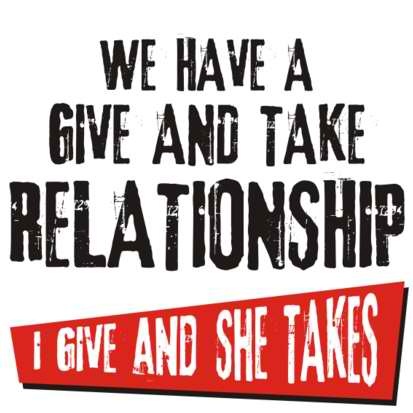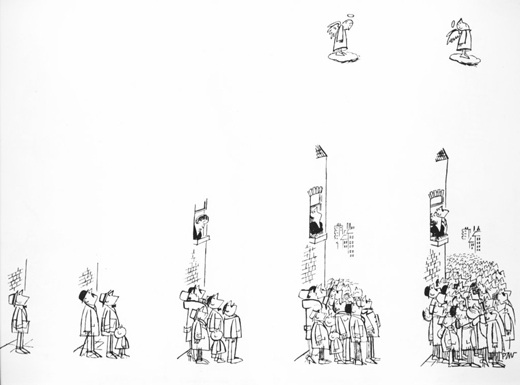Robert B. Cialdini: Influence: Science and practice
Study notes
Chapter 1: Automatic behavior
By evolution animals including humans react on certain triggers and play back appropriate responses. We call them automatic actions and they have evolved to help us perform the correct action such as taking care of children and protecting against attacks without the need for cognitive work. They are effective but can be manipulated by an adversary. Humans don't rely on these automatic responses at the same degree as other animals, and we tend to need more factors for them to trigger. They can be controlled to a high degree because we realize the personal impact it has or have deeper knowledge of the situation. Like the correct price of a good.
One example of such an effect is "contrast": Our evaluation of something as being good or bad, expensive or cheap relies on what we compare it with, and by manipulating how we are able to compare an object, the object itself can be "forced" to seem better or worse than we would judge it by itself. A heavy weight feels heavier after first lifting a light weight, as compared to lifting only the heavy weight. As a society we rely on automatic behavior for simplifying difficult decisions. One example is that we tend to use high price as a sign of good quality. Because of these shortcuts we can focus our limited time and capacity on more important matters.
The following chapters explain some key methods of influence. The obvious "everybody seeks the best trade possible" is omitted because it's universally accepted. It still applies though, and presenting an objective better offer is probably going to work. Otherwise you might find these methods turning events in your favor.

From http://karladawn.files.wordpress.com/
Chapter 2: Mutuality (Gjensidighet): Give and take... and take
The main idea is that by social norms we don't want to receive a gift or service without paying it back at the same or even higher value. The "unfair" part of this effect is that we tend to have trouble saying "no" to a gift and thus "have to receive it". By introducing with a "free gift" most people are more likely to give something back compared to when they are just asked to give or buy something. Politicians like "Arbeiderpartiet" in Norway hand out red roses in order to "buy" us into voting for them.
A rationale for this effect is that it was a benefit of tribes that individuals could trust each other and that one could risk giving away help and know it would be payed back when the situation of need were turned later on. Examples from the book: Hare Krishna Society giving out a cheap flower to "force" people to give a monetary gift. The flowers could often be reused as they most often ended up in trash cans. Politicians and alliances regarding getting accept for laws, free trials for products. Another aspect is the confession technique where one first asks for a "favor" that is unreasonable, and then lower the favor giving an impression that something less good is also ok. This "forces" the asked party to accept more and perhaps accept the favor / trade. Watergate was used to exemplify this effect. The effect can also be seen in haggling.
Chapter 3: Consistency (Konsistens): Act consistently according to previous acts and claims
After we make a decision, we have much more faith in the decision than before we made it, as if making the decision makes the uncertainty go away. This is important socially when we say (or write) something, we want to stay consistent to it. Our mind finds ways to rationalize previous decisions. Example from the book was an arranged theft of equipment at a beach when the owner was taking a walk. Uninvolved observers did nearly nothing while observers asked to "watch over" the things nearly always went to extremes to protect and watch over the equipment. The agreement to watch over the equipment lead to both personal involvement and also increased focus.
Personal consistency, that we do what we say we will do, is appreciated highly and is a requirement for mutuality. The wish to believe can be greater than rational thought as explained in an example of the "Transcendental Meditation" hoax. Toy stores have used the effect of parents promising a new toy for christmas to children. The toy is heavily marketed on television commercials and when time is ready for releasee, the availability very far from sufficient. Parents needs to buy something else now and when the toy is available just after christmas parents are "forced" to buy it in addition at an even higher "non-sale" price.
The method can be exploited by introducing requests that gradually increase in consequence like the example of owners of homes asked to have a "drive safely" sign in their gardens by first asking them to put up a very tiny label. What does the people going around collecting signatures for causes actually have in mind? US prisoners of war in China and how they were manipulated to have a more positive view on China by rewarding them when writing positive things of China while imprisoned. Having customers sign a sales contract or have them write positive things of a product in order to have a chance to win something is are related examples. The social component is the essence. Examples of "hell weeks" for acceptance in different kind of special groups involving physical pain and or humiliation was said to be related. Rewards had to be small or non existent because actions must not be subject to dismissal of external reasons.
Chapter 4: Social evidence (Sosiale bevis): Do what others do
Why does fake laughter in comedy TV work? When uncertain of what the correct action is, we look at what others do. Commercial with "everybody else uses...", "most selling product" etc. People getting curious because other do.

From http://www.geldverdienen-internetmarketing.de
Exemplified with cult mass murder, getting help in crowds, newspapers talking of accidents and suicide and "strange" correlations.
Chapter 5: Sympathy (Sympati): Being liked
Easier to say yes to somebody whom we like. Tupperware companies misuse the friendship bonds by having sales meetings in personal homes of the customers. Physical attraction (halo effect), similarity with one self, compliments, associations (master card logo).
Chapter 6: Authority (Autoritet)
Electricity induced pain experiment with interesting findings. People in charge, people with expert knowledge. Problems in not questioning authorities such as medical doctors giving wrong prescriptions, flight leads doing obvious mistakes but not handled by the co pilot. Title, height, cloths, material goods. Uniforms represents authority but can be misused.

From: http://search.dilbert.com/comic/Tall%20Manager
Chapter 7: Scarcity (Knapphet)
We want what we can not have or what seems lucrative or soon will not be available anymore. Time limiting, censorship. Sudden changes in availability. Two year olds and teenagers are specially sensitive for such changes.
As final words the book talks of how we use only fractions of available information, leading to the "click-respond" actions where certain information is giver a very high weight for making decisions. Kind of similar to how machine learning problems are solved by finding attributes what have high predictability capacity without really understanding the problem domain. We rely on being able to use these shortcuts because the world is getting too complex. We must therefore fight any attempt to break our trust in these signals and fight people trying to misguide us using these tricks. We are in the information age, but information is not turned into knowledge without processing, understanding and utilization of it.